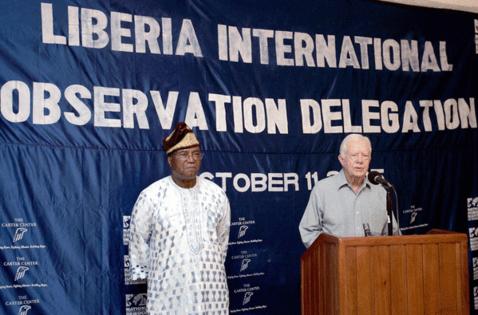'Evangelist for democracy': Carter started election observation and fought fraud
Published in Political News
ATLANTA — Once the victim of his own stolen election, Jimmy Carter later launched an international election observation operation that continues to watch for fair and democratic results.
Part of the former president’s lasting legacy, the Carter Center’s election monitoring work started in 1989 with missions to Central American nations and later expanded within the United States after the 2020 election.
Carter saw a need for greater accountability through election observation efforts to help ensure the results reflect the will of the voters, said David Carroll, director for the Carter Center’s Democracy Program.
“It’s a critical way to have leaders that can be recognized as genuinely democratically elected,” Carroll said. “Those can be really divisive issues, and we’re helping to make it a more transparent process so that all sides can have confidence in the results.”
Carter’s election advocacy was rooted in his run for state Senate in 1962, when the Democratic Party chairperson in Quitman County stuffed a cardboard ballot box for Carter’s opponent. A reporter for The Atlanta Journal, John Pennington, discovered ballots from people who were dead or in prison.
After a judge ordered a new election, Carter won the Senate seat on his way to the governorship and presidency, which lasted from 1977 to 1981.
During Carter’s first election observation in Panama in 1989, he called out dictator Manuel Noriega for falsifying election results after it became clear his candidates had lost, according to the Carter Center. Speaking in Spanish, Carter said, “Son ustedes honestos o ladrones?” (”Are you honest people or thieves?”)
Following media coverage, the candidates supported by Noriega never took office. A U.S. invasion removed Noriega from power soon afterward.
The Carter Center has observed 125 elections in 40 countries and three Native American nations.
Carter also played a key role in modernizing U.S. elections in the years after the 2000 election, which was marred by outdated voting machines and an incomplete recount.
Carter led the Commission on Federal Election Reform with former Republican Secretary of State James Baker, which recommended more professional oversight of elections, stronger controls on absentee ballots to reduce the possibility of voter fraud, increased voter registration and photo ID.
“It’s hard to imagine anyone who is a greater evangelist for democracy,” said David Becker, executive director for the Center for Election Innovation & Research, an organization that works with election officials to improve voter confidence. “He did the hard work of the nuts and bolts of democracy. He made sure it actually works and gives voters’ confidence that their vote had meaning.”
While the Carter-Baker Commission’s recommendations weren’t adopted at a national level, states such as Georgia later passed laws enacting several of its proposals.
Becker said the commission had a lasting impact by professionalizing election administration, an effort that paid off when the election system withstood the pressures of the 2020 and 2024 elections.
After the contentious 2020 election between Joe Biden and Donald Trump, Carter spoke out against Georgia’s elections overhaul law that capped the number of ballot drop boxes, required more proof of ID and eliminated the ability to request absentee ballots entirely online.
“We must not promote confidence among one segment of the electorate by restricting the participation of others,” Carter said in 2021. “Our goal always should be to increase, not decrease, voter participation.”
Since 2020, the Carter Center has expanded its observation efforts to include areas within the United States.
Monitors have watched and reported on elections in Fulton County and the Carter Center has assisted observation groups in other states including Michigan, Montana and New Mexico.
“We started to recognize that the United States was increasingly having the same characteristics” of mistrust and political polarization, Carroll said. “These were exactly the kind of situations that we would prioritize globally, and therefore we took a long, hard look at how we could engage domestically.”
©2025 The Atlanta Journal-Constitution. Visit at ajc.com. Distributed by Tribune Content Agency, LLC.




























































Comments